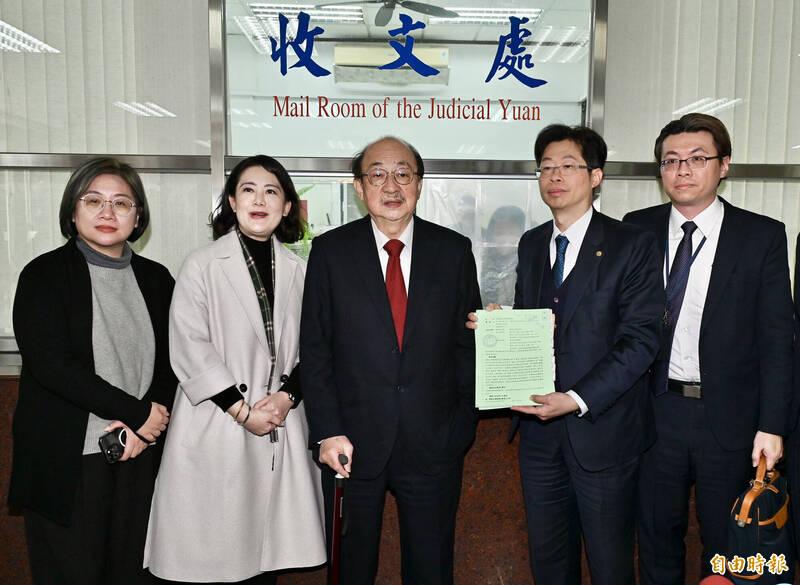The Democratic Progressive Party (DPP) this morning requested an injunction and constitutional interpretation of the amendments to the Public Officials Election and Recall Act (公職人員選舉罷免法) which took effect today after President William Lai’s (賴清德) promulgation on Tuesday.
DPP caucus whip Ker Chien-ming (柯建銘) said it is unconstitutional to require people initiating or signing a recall petition to provide photocopies of their identification cards when submitting petition signatures, which the amendments make compulsory, and that people could risk being put in jail if they were not careful enough when exercising basic human rights.
The new law includes punitive measures, stipulating that anyone found guilty of using someone else’s identification or forging an ID for a recall petition could face up to five years in prison or a fine of up to NT$1 million (US$30,536).

Photo: Tu Chien-jung, Taipei Times
Article 17 of the Constitution entitles people with “the right of election, recall, initiative and referendum,” while Article 22 guarantees people “all the freedoms and rights that are not detrimental to social order or public welfare,” Ker said.
He said their request is to seek remedy and maintain constitutional order as “no political parties or single person can stand on the opposite side of the Constitution.”
However, the newly amended Constitutional Court Procedure Act (憲法訴訟法) mandates that a minimum of 10 grand justices must hear and rule on a case, and that a ruling that something is unconstitutional must be supported by at least nine justices.
Currently, the Constitutional Court has only eight grand justices, as the Legislative Yuan has declined to approve a new slate of seven nominees put forward by Lai in December last year.
Chinese Nationalist Party (KMT) caucus whip Fu Kun-chi (傅崐萁) today said it would be illegal as there are not enough grand justices to make a constitutional interpretation ruling.
The amendments to the act, proposed by KMT legislators and backed by their counterparts from the Taiwan People’s Party, were passed by a majority of lawmakers on Dec. 20 last year.
The Cabinet on Jan. 24 requested the legislature to reconsider the amendments based on the provisions of the Constitution, saying it would be difficult to execute.
However, the Legislative Yuan on Tuesday last week voted to uphold the new legislation and sent it to the Presidential Office a day later, paving the way for its promulgation by Lai on Tuesday.
The Ministry of the Interior said it deeply regrets that it would be almost impossible to initiate a recall petition in the future as the newly amended law would raise the threshold and restrict the public’s right to recall elected politicians without obtaining public consensus.

Taiwan's Vice President Hsiao Bi-khim (蕭美琴) said Saturday that she would not be intimidated by the Chinese Communist Party (CCP), following reports that Chinese agents planned to ram her car during a visit to the Czech Republic last year. "I had a great visit to Prague & thank the Czech authorities for their hospitality & ensuring my safety," Hsiao said on social media platform X. "The CCP's unlawful activities will NOT intimidate me from voicing Taiwan's interests in the international community," she wrote. Hsiao visited the Czech Republic on March 18 last year as vice president-elect and met with Czech Senate leadership, including

There have been clear signs of Chinese Communist Party (CCP) attempts to interfere in the nationwide recall vote on July 26 in support of Chinese Nationalist Party (KMT) legislators facing recall, an unnamed government official said, warning about possible further actions. The CCP is actively involved in Taiwanese politics, and interference in the recall vote is to be expected, with multiple Chinese state media and TAO attempts to discredit the Democratic Progressive Party (DPP) and undermine public support of their recall movement, the official said. This interference includes a smear campaign initiated this month by a pro-Beijing Hong Kong news outlet against

A week-long exhibition on modern Tibetan history and the Dalai Lama’s global advocacy opened yesterday in Taipei, featuring quotes and artworks highlighting human rights and China’s ongoing repression of Tibetans, Hong Kongers and Uighurs. The exhibition, the first organized by the Human Rights Network for Tibet and Taiwan (HRNTT), is titled “From the Snowy Ridges to the Ocean of Wisdom.” “It would be impossible for Tibetans inside Tibet to hold an exhibition like this — we can do it. because we live in a free and democratic country,” HRNTT secretary-general Tashi Tsering said. Tashi Tsering, a Taiwan-based Tibetan who has never

A first shipment of five tons of Taiwan tilapia was sent from Tainan to Singapore on Wednesday, following an order valued at NT$600,000 (US$20,500) placed with a company in the city. The products, including frozen whole fish and pre- cooked fish belly, were dispatched from Jiangjun Fishing Harbor, where a new aquatic processing and logistics center is under construction. At the launch, Tainan Mayor Huang Wei-che (黃偉哲) called the move a “breakthrough,” marking Taiwan’s expansion into the Singaporean tilapia market. Taiwan’s tilapia exports have traditionally focused on the United States, Canada, and the Middle East, Huang said, adding that the new foothold in